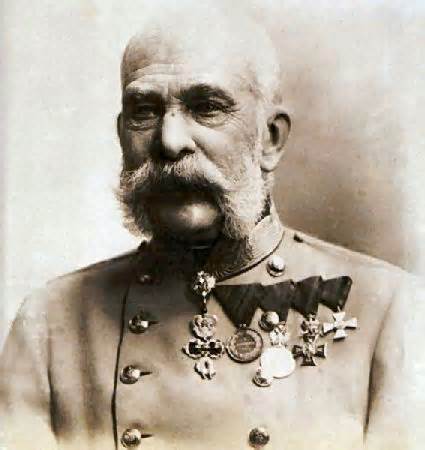Franz Josef: Austria-Hungary's Penultimate Emperor
Franz Josef was Austrian emperor from 1848 to 1916. During that time, he presided over a large number of changes in his homeland, including the devastation of World War I. Born into royalty in 1830, Franz Josef found himself the oldest of five children, four of whom became archdukes and one of whom also became emperor of Mexico. (The fifth child, a girl named Maria, died when she was 4.)
The reign of Franz Josef was marked throughout by internal struggles. The Austrian Empire comprised vast amounts of land populated by many different ethnic groups, some of whom were quite happy to be ruled by an emperor in Vienna and some of whom wanted their own say in their own affairs. One such group was the Hungarians, who had a proud tradition dating back through the Magyars and who wanted nothing more than to govern themselves. A Hungarian uprising in 1849 (despite the passage of a constitution earlier that year) led to a military struggle, and Franz Josef appealed to Russia for help. Tsar Nicholas I sent troops to Hungary in support of Austrian forces, and the revolt was unsuccessful. Not long after the victory, Franz Josef revoked the constitution and restored absolute monarchy. On another front in 1849, Austria was victorious as well, defeating the Kingdom of Sardinia in the First Italian War of Independence, a struggle over territory in northern Italy. Unrest in Hungary was present throughout the reign of Franz Josef. A Hungarian nationalist was unsuccessful in an assassination attempt against the emperor in 1853. The tall, reinforced collar on his uniform blunted the force of the knife attack enough for the emperor to escape with minor injuries. (More successful was the Italian nationalist who killed the Empress, Elizabeth, in 1898, in a fit of rage after losing a chance to kill his intended target, the heir to the French throne.) 
In the same year that Franz Josef survived his assassination attempt, the Crimean War began. This was a struggle between Russia on one side and, on the other side, Great Britain, France, the Ottoman Empire, and Sardinia. Most of the fighting took place in the Crimean Peninsula, in the Black Sea area. By 1856, the war had reached a period of stalemate, despite the capture by allied forces of the key Russian Black Sea port of Sevastapol. Austria announced its intention to enter the war against Russia. The result was a Russian surrender. Not surprisingly, this series of events soured relations between Austria and Russia. A decade after Austria's victory over Sardinia in the First Italian War of Independence, the two sides went to war again, with France joining Sardinia in the Second Italian War of Independence. Austrian forces a series of battles in the war, including the Battle of Solferino, in which Franz Josef himself commanded an army. Faced with another uprising in Hungary, Franz Josef admitted defeat in Italy and agreed to an armistice, ceding a large amount of territory in northern Italy. In conjunction with yet another war of Italian Independence, Austria fought a war with Prussia, which the latter won in only seven weeks. A year later, Franz Josef presided over the formation of the Dual Monarchy of Austria-Hungary. He was the emperor, but he ruled over an increasingly disparate set of countries, territories, and peoples. (At the same time, Franz Josef's brother Maximilian was removed as Emperor of Mexico, having lost support of the French troops that had occupied Mexico since 1861.) Seeking help in other quarters, Franz Josef signed on to the League of Three Emperors along with Russian Tsar Alexander II and Germany's Wilhelm I. This alliance lasted a few years but was undone by the competing interests of Russia and Austria-Hungary in the Balkans. The Dual Monarchy took the strongest step yet in 1908, annexing neighboring Bosnia and Herzegovina, completing a process begun with military occupation in 1878. The resulting tensions among Austrians, Bosnians, Serbians, and Russians boiled over into war, precipitated by the assassination of Franz Josef's heir, Franz Ferdinand, in Sarajevo on June 28, 1914. The result was war, one that the Dual Monarchy didn't find unwelcome. By this time, despite his desire to have a union between the two countries with himself as the emperor, Franz Josef had strengthened his relationship with the now-united Germany. The two leaders had entered into the Triple Entente, and Franz Josef called on Wilhelm I to uphold his side of the bargain when Russia mobilized its troops. Germany did so, on August 1. The emperor left the prosecution of the war up to his foreign minister, Leopold von Berchtold, and the military. Austrian forces, depleted from a series of conflicts in the decades leading up to the war, did not fare well. Franz Josef died of pneumonia in the middle of the war, on November 21, 1916. He was 86. He reigned for 68 years, which some sources record as the third-longest European reign. He was succeeded by his grand-nephew Karl. |
|
Social Studies for Kids
copyright 2002–2026
David White



 In 1848, when revolutions occurred in several countries throughout Europe, Franz Josef, then an archduke, went to war as a soldier in a struggle between Austria and Italy. Late that same year, after his uncle,
In 1848, when revolutions occurred in several countries throughout Europe, Franz Josef, then an archduke, went to war as a soldier in a struggle between Austria and Italy. Late that same year, after his uncle, 
